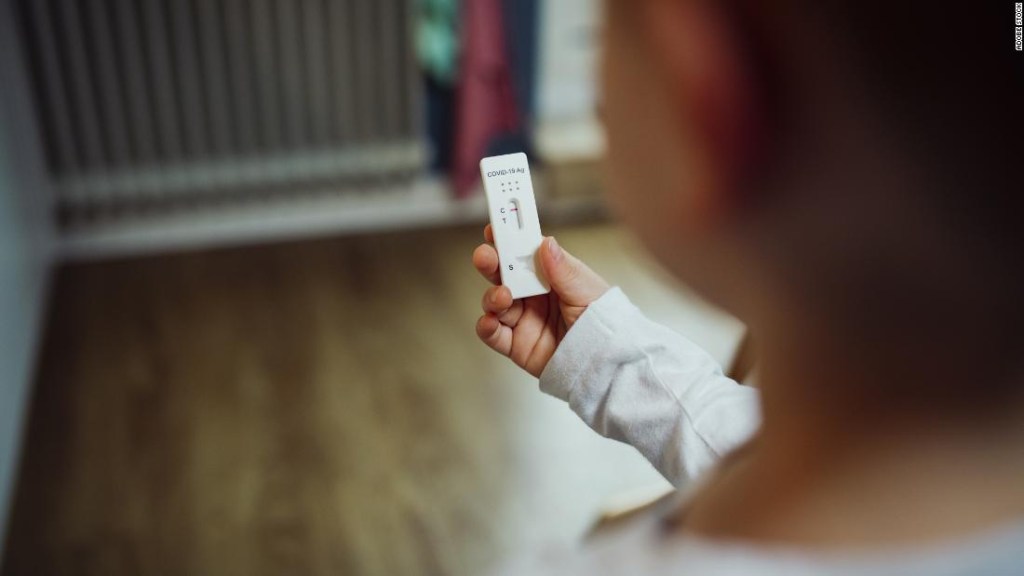Daily COVID-19 infections rise 47% in the US 1:13
(CNN) -
It's much easier to catch coronavirus these days as the highly contagious omicron variant spreads around the world.
As people grapple with this reality, it's important to note that the U.S. Centers for Disease Control and Prevention (CDC) also recently changed their guidelines on isolation and quarantine.
Many have doubts about what to do if they or someone in their family ends up infected with Covid-19.
5 reasons why you shouldn't purposely get an omicron to "get out of it"
What happens if a child tests positive for covid-10?
How should parents and guardians safely care for that child?
What happens if a parent has covid-19, but their children don't?
How long should someone be in isolation?
When should people get tested?
What happens if everyone in the family gets COVID-19?
Do they need to isolate themselves from each other?
To answer all of these questions, I spoke with one of our leading experts: Dr. Leana Wen, CNN Medical Analyst, ER doctor, and professor of health policy and management in the Milken Institute School of Public Health at George University. Washington.
She is also the author of "Lifelines: A Doctor's Journey in the Fight for Public Health" and the mother of two young children.
This is the projection of deaths from covid-19 in the US 0:32
You've talked a lot about the difference between isolation and quarantine - what is it and why is it important?
Dr. Leana Wen:
There is a big difference and it is important to distinguish the two.
The guidelines are very different, depending on whether you are in isolation or quarantine.
Isolating yourself is what you should do when you are diagnosed with covid-19.
Meanwhile, quarantine is what you could do if you were exposed to COVID-19 but still don't have a diagnosis.
The CDC has very different guidelines for isolation versus quarantine, so specific vocabulary is important.
Many families face situations in which someone tests positive.
If a family member, say a parent, has COVID-19, what should they do?
Do you have covid-19?
This is how you can treat the disease at home: from what to take to when to see a doctor
That person should immediately isolate himself from others.
It should be assumed that someone who has just been diagnosed with covid-19 is potentially infectious.
All other family members should also be screened immediately.
The person who tested positive may not have been the first person to get COVID-19, and other members may test positive as well.
advertising
What if everyone tests positive for covid-19?
Do they need to isolate themselves from each other?
If everyone has covid-19 they do not need to isolate themselves from each other.
That's because it is quite unlikely that they have different strains of coronavirus.
They all probably got the same strain from each other, and they won't re-infect each other as quickly.
The whole family, of course, must isolate themselves from other people.
Does getting infected with omicron result in immunity to the virus?
0:58
What to do if one child tests positive and everyone else tests negative?
Who will take care of it?
This is very difficult, especially if you are a younger child who cannot take care of himself.
I would assess the circumstances of the home.
Let's say there are two parents or primary caregivers, and both are vaccinated, boosted, and generally healthy.
Let's say there is another child who is not vaccinated and therefore has a higher risk of severe disease from covid-19 compared to one who is vaccinated.
If a young child tests positive for COVID-19 and other family members are at risk of becoming seriously ill, forming a capsule at home with the child and one of the parents is an option, advised Dr. Leana Wen, a medical analyst at CNN.
In that scenario, I would recommend dividing the household.
In this way, one of the parents will take care of the child who has covid-19 and the other will take care of the child who does not have it.
The two "clusters" or "capsules" must not interact with each other during the isolation period.
If possible, they should not share any interior space.
They should sleep in different rooms, not share the same bathroom, and not meet indoors during this time.
The parent caring for the child with COVID-19 should wear a mask when with him to try to reduce the likelihood of infection.
America reports 250% increase in covid cases in early 2022 compared to 2021
The situation is more challenging if there is only one parent or caregiver.
Ventilation - opening windows and doors when feasible - can help.
Like washing your hands properly and wearing a mask.
Does isolation mean that you should be inside your house all the time?
Can you go out and get some fresh air?
Technically, isolation means that you have to be indoors and away from others.
However, this is where you can use common sense.
If you live in a house, townhouse, or apartment where you don't have to go through any shared space to get fresh air, you can go outside.
Be careful, stay very far from others and do not share interior spaces with people.
None of us want to inadvertently infect others.
Fauci explains why the CDC changed the covid-19 isolation guidelines 1:03
How long should someone isolate themselves?
The new CDC guidelines basically shorten the isolation period from 10 days to five days, with an additional five days of mask use. This means that you must remain completely isolated for the first five days. After that, you can go out (to work, to the grocery store, etc.), but you should wear a high-quality, well-fitting mask when in public spaces. Do not go to places where you will be without a mask, such as restaurants.
"Most people will get COVID-19," says FDA Acting Commissioner
When it comes to people from the same family, this guideline means that you really shouldn't eat together or have other casual, unmasked encounters with uninfected members of your family within the 10-day period.
If the families are in two groups, these should not mix for 10 days inside the house.
If someone had symptoms on Monday, was tested on Wednesday, and then got the results on Friday, when does the five-day period start?
Monday.
The five-day period begins when someone first begins to have symptoms.
If an asymptomatic person is tested and their result is positive, the five-day clock starts when the test was performed.
If you are not sure, for example if you feel a little exhausted on Sunday but don't have full symptoms by Tuesday, use the date you are sure of symptoms.
Remember that the count starts on day zero.
The first day is the first full 24 hours after the onset of symptoms or after the positive test.
When should you take the test again?
To be tested or not for covid-19?
The medical keys 2:05
The CDC does not recommend testing to get out of isolation. What they say is that you can get a rapid antigen test on day five. But then if it's positive, you need to keep isolating yourself for another five days.
I do not agree here with the CDC. If you have rapid tests available, I think you can take it from the fifth day. If it is negative on day five and negative the next day (day six), I think it would be reasonable to end the isolation. This could be crucial for families, for whom being separated from each other is a major inconvenience. It's also important to note that the PCR test, while more accurate for initial diagnosis, is not the one you should use after your diagnosis has already been confirmed. This is because the PCR test is so sensitive that it detects small virus fragments, and people infected with COVID-19 could test positive by PCR weeks after they are no longer infectious.
What about those who initially tested negative for COVID-19?
When should they be tested again?
The CDC recommends that those exposed to someone with COVID-19 get tested no earlier than five days after their exposure.
The agency further breaks this down into whether you're vaccinated and boosted, compared to if you're not.
It also considers those who had covid-19 in the last 90 days the same as if they were vaccinated and boosted.
If you are not, you should quarantine until the test result is negative at least five days later and then wear a mask for another five days in public.
If you have the vaccine, then you don't need to quarantine yourself, but you do need to be tested within five days.
This is where I would add a little more nuance to the CDC guidance.
First, if you have rapid tests available, I think it is reasonable to test family members every day.
They may not come out of quarantine until at least five days later, but testing positive sooner would change the way family members interact with each other.
Perhaps the entire family is already exposed and tests positive within a day or two, eliminating the need to separate.
Second, while the CDC says exposed people don't need to self-quarantine if they are up-to-date on vaccinations, employers and schools may have different guidelines.
Be sure to check with them before sending your kids or going back to school and work yourself.
ContagionCovid-19families








